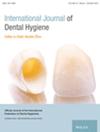Erythritol powder airflow for the treatment of peri-implant mucositis: A randomized controlled clinical trial
Abstract
Objectives
Peri-implant mucositis is a biofilm-related, reversible inflammatory disease that can evolve into peri-implantitis if not adequately treated. The aim of the present randomized controlled clinical trial was to evaluate the efficacy of air-abrasive powder as compared to chlorhexidine (CHX) for the treatment of peri-implant mucositis, in terms of clinical and patient-reported outcomes (PROMs) and occurrence of peri-implantitis 12 months after treatment.
Methods
In the control group, full-mouth calculus and plaque removal was performed with ultrasound and manual devices, and a 1.0% CHX gel was applied; in the test group, supra- and subgingival biofilm removal was performed using erythritol powder with a dedicated nozzle and calculus removal was performed with ultrasonic instruments if needed. Bleeding and plaque indexes, peri-implant probing depth and tissue level were measured at 1 week, and 1, 3, 6 and 12 months after treatment, while PROMs were evaluated up to 7 days after treatment.
Results
Among 80 included implants, 70 were analysed at 12 months follow-up (30 in the test group, 40 in the control group, and 20 subjects). Success rates (implant-level) in terms of bleeding index were significantly different between the test (96.7%) and control group (92.5%); as for PROMs, only taste sensation was significantly better in the test group. The test group was significantly correlated to the smallest changes in peri-implant probing depth between baseline and 3 months.
Conclusions
The study showed that both treatment strategies are effective. This suggests that the use of air-abrasive powders could be used as an alternative biofilm removal method instead of adjunctive treatments with antiseptics.

 求助内容:
求助内容: 应助结果提醒方式:
应助结果提醒方式:


